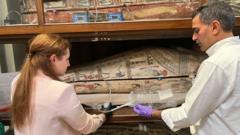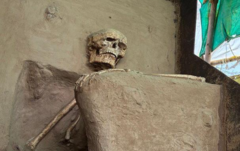Scientists have made a fascinating discovery regarding ancient Egyptian mummies: despite being entombed for over 5,000 years, their embalmed remains still emit a surprisingly pleasant aroma. An examination of nine mummies revealed that, although the intensity of the fragrances varied, they broadly shared descriptions such as "woody," "spicy," and "sweet." This revelation not only sheds light on the mummification process but also allows modern audiences to connect more deeply with ancient Egyptian culture.
The initiative, led by Dr. Cecilia Bembibre from University College London, aims to recreate these aromas chemically for display at the Egyptian Museum in Cairo. The method employed was notably non-invasive; researchers utilized a tiny tube to extract scent without disturbing the mummies. “We were surprised at the pleasantness of them,” Dr. Bembibre told BBC Radio 4, highlighting the misconceptions that often surround mummies in popular media.
Historically, the inclusion of fragrant oils, waxes, and balms was a critical aspect of mummification. It was believed these scents would help usher the deceased spirit into the afterlife. As a result, royal figures and nobility received not only the finest embalming but also a sensory send-off that emphasized the importance of olfactory experiences in ancient rituals.
Ally Louks, an English literature professor whose research focuses on the politics of smell, praised this innovative venture. She noted that engaging the sense of smell evokes robust emotional responses and offers a fresh lens through which to explore ancient practices. "Smells were crucial to social, religious, and personal activities in ancient Egypt,” Louks remarked.
Beyond enhancing museum experiences, the findings from this study may significantly benefit conservationists. Utilizing gas chromatography, researchers analyzed the various scents from within the sarcophagus, linking them to the decomposition of animal fats used in the embalming process. This data could provide valuable insights on how best to preserve mummies for future generations.
Matija Strlič, another member of the research team, indicated that the study’s methodology could extend to other museum collections, enhancing the ways in which artifacts are presented and experienced by the public. This multi-sensory approach promises to not only illuminate the past but also ensure its preservation, allowing people today to engage with history in a new and meaningful way.




















